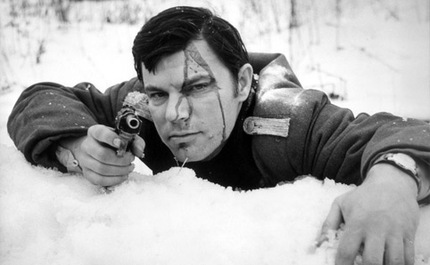Review: TRIAL OF THE ROAD Is A Brilliant Absurdist Condemnation

Welcome back
to my ongoing coverage of the Melbourne Cinematheque's fantastic program for
2013. Here, I will be reviewing the first film each season (month). This month I
took a look at Trial of the Road (1971), the first of the films from
Russian director Aleksey German. For the month of February I introduced one of
Keisuke Kinoshita's works which
can be found here. I hope you saw at least something from this series!
Running
from March 6-20, Aleksey German's retrospective of shocking and eye opening films
that centre on the condemnation of the censored past of the Soviet Union
display an uncanny filmmaking ability unlike anything at the time. Mixing
hyper-surrealism and undefined characters that can never be identified as good or
bad, all in the era of Stalinism, he unmasks the absurd pointlessness of war.
Trial of the Road was
so shocking to Russian sensibilities in the way that it condemned the utter fiasco that
was the era's Soviet forces that it was actually banned in the USSR for
fifteen years. Set during World War II, a Russian soldier, totally
disillusioned, defects to the invading Nazi forces but is later captured and
taken as a prisoner of war during the Soviet winter offensive. Here he
befriends other fellow deserters who have also lost hope. Then, the general of the offensive offers him a chance for redemption, but only if he takes part in a
suicide mission.
The
film begins with an utterly stark image of a blanket of white snow. Frustrated
Russian farmers watch it as the camera pans to reveal German forces
ruining their harvest and taking their livestock. A voice over lays out the situation, but words only act as an ancillary device to the desperation of the harsh
black and white footage. There is however a purposeful contradiction as these scenes are accompanied by a slightly upbeat score which plays
in time as German forces load trains with the stolen livestock. Cut to the
Soviet forces, who by comparison seem to have no level of coordination. Here men
bicker and tell inane stories, other men bully each other over petty things. It seems the German
invading forces are far less inept. And this is the point. Aleksey hammers this message in time and again to great effect.
This
is war, however, and these men have a mission. There is a fearful urgency to
their relentless march through the tundra of unforgiving white. The
cinematography is sublime and there is an absolute otherworldly quality to the
terrain and small villages they trundle through. This feeling of urgency is
bolstered by the sudden and brilliant flashes of combat that inextricably come
from nowhere, as if we're in a fever-dream.
These scenes escape out of the battlefield and into residential spaces. They are loud and the casualties are obvious from the visceral action, but the
cinematography is distant and yet powerfully striking. This is another surreal
contradiction that heightens Aleksey's film.
The
narration and dialogue are other matters entirely. In order to contradict the cohesive
confidence of communist forces, the film is peppered with an inept and nervous cast of characters with mass dissention in the ranks. The
innocents also voice their opinions, and arguably there is a more justified and
proud voice here. A soldier hiding out like a coward is questioned by a woman
in the house. When he asks her if she wants to live she boisterously replies, 'I'll
live until I drop dead.' Likewise, the deserters, who by all counts should be villainized
for their treason, are instead humanised by Aleksey and shown as suffering under
Soviet forces' arrest. The deserters refer to the forces as 'partisan louses,' and
from their depiction in the film, one would find it difficult to argue.
The
jarring juxtaposition of dialogue and combat works supremely well in the film's favour,
particularly the finale, which depicts an epic battle devoid of meaning. Trial of the Road
is a bizarre and overwhelming experience, the strangest anti-war movie I have
ever seen, and yet undeniably compelling and gorgeously shot. Aleksey German
is truly a unique voice in Russian cinema and I look forward to the rest of his
season.
Please check the Melbourne Cinematheque
guide for the rest of the films comprising German's marvelous season. I will
return in April for 'the many incarnations of Jean-Luc Godard and his classic Two or Three Things I know About Her. Additionally
do not miss Alphaville (April 10) on
the big screen!







